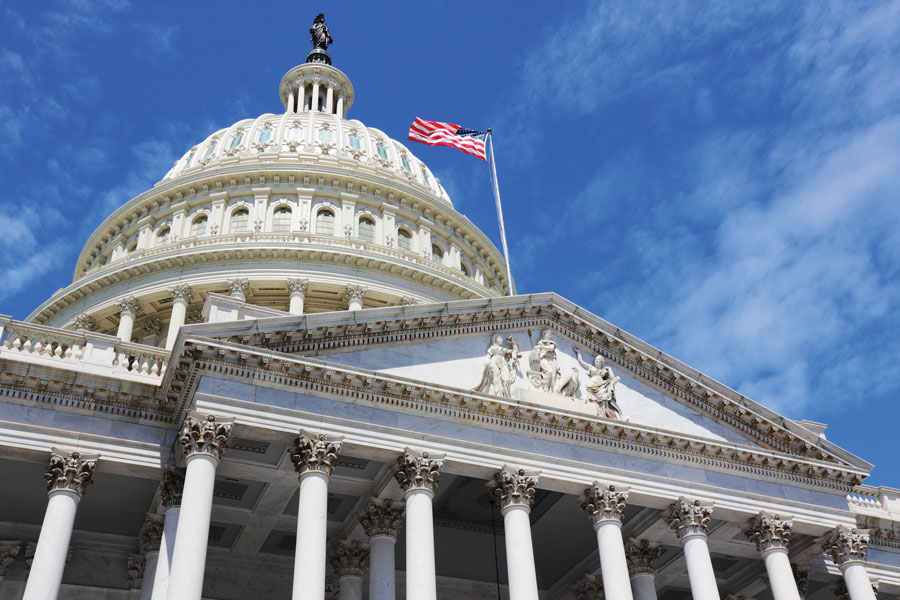

U.S. stocks stabilized in the green, though they remained well off session highs after protesters surged into the U.S. Capitol, forcing a lockdown that interrupted certification of the presidential election.
The S&P 500 trimmed its advance to 0.6% at the close of trading in New York, after rallying as much as 1.5% earlier Wednesday. Equities had been on track for a record, buoyed by speculation that a Democratic control of Congress could unleash a torrent of spending to revive growth. That sparked a reflation trade, with investors pouring into small caps and banks, companies that benefit from an economic rebound. Tech shares lagged behind.
The S&P 500 gained 21.28 points to close at 3,748.14, after having traded as high as 3,783.04 earlier. The Dow Jones Industrial Average closed at 30,829.04, up 437.80 points, after having traded as high as 31,022.65 earlier. The Nasdaq gave up all its earlier gains to close down 78.17 points at 12,740.79; earlier it had traded as high as 12,909.63.
Vice President Mike Pence left the floor of Congress as hundreds of protesters swarmed past barricades surrounding the building where lawmakers were debating Joe Biden’s victory in the Electoral College.
Meanwhile, Democrats claimed one of the two Senate seats contested in Georgia and led in the other tight race. Two wins would give Biden’s party control of Congress and smooth the path for some of his spending policies. That’s fueled bets that increased stimulus will boost the economy and spark inflation. The 10-year Treasury yield climbed past 1% for the first time since March, and the dollar fluctuated.
“The growth-into-value rotation may be reinforced after the results of the Georgia Senate election amid the prospect of a higher fiscal stimulus bill and steeper yield curve, which would benefit banks and other non-tech companies,” David Bahnsen, chief investment officer of the Bahnsen Group in Newport Beach, California, wrote in a note to clients.
Congress passed at year’s end a $900 billion spending deal to bolster an economy showing signs of slowing as the raging virus prompts stricter lockdowns across the country. The number of employees at U.S. businesses unexpectedly declined in December for the first time since April, underscoring the ongoing labor-market fallout from the pandemic. The figures preceded the monthly jobs report on Friday, which is projected to show weaker payroll growth.
Federal Reserve officials unanimously backed holding the pace of bond buying steady when they met last month. “All participants judged that it would be appropriate to continue those purchases at least at the current pace, and nearly all favored maintaining the current composition of purchases,” according to minutes of their Dec. 15-16 meeting published Wednesday.
U.S. 10-year breakevens -- a market gauge of inflation expectations over the next decade -- topped 2% this week for the first time since 2018, having gained in each of the last three months. While the pandemic is still raging with the rollout of vaccines in the early stages, the risk is that further signs of inflationary pressure could start prompting bets on Fed rate hikes.
For Matt Miskin, co-chief investment strategist at John Hancock Investment Management, the ball will be in the Fed’s court next and how policy makers will react to this evolving political backdrop.
“They have been wanting more fiscal support, well now they have it, and it is coming with a cost -- higher interest rates based on Treasury yields rising,” Miskin noted. “We will see what the Fed’s pain threshold is for higher Treasury yields in the first half of 2021. The tug-of-war between monetary and fiscal policy will be key to markets. While the fiscal side is looking more promising based on the results today, monetary policy may take a step back.”
Elsewhere, Bitcoin jumped to another all-time high as extreme swings continued to buffet the world’s largest cryptocurrency. And the New York Stock Exchange is proceeding with a plan to delist three major Chinese telecommunications firms, its second about-face this week, after U.S. Treasury Secretary Steven Mnuchin criticized its shock decision to give the companies a reprieve.

Looking to refine your strategy for investing in stocks in the US market? Discover expert insights, key trends, and risk management techniques to maximize your returns

The RIA led by Merrill Lynch veteran John Thiel is helping its advisors take part in the growing trend toward fee-based annuities.

Driven by robust transaction activity amid market turbulence and increased focus on billion-dollar plus targets, Echelon Partners expects another all-time high in 2025.

The looming threat of federal funding cuts to state and local governments has lawmakers weighing a levy that was phased out in 1981.

The fintech firms' new tools and integrations address pain points in overseeing investment lineups, account monitoring, and more.
RIAs face rising regulatory pressure in 2025. Forward-looking firms are responding with embedded technology, not more paperwork.
As inheritances are set to reshape client portfolios and next-gen heirs demand digital-first experiences, firms are retooling their wealth tech stacks and succession models in real time.
